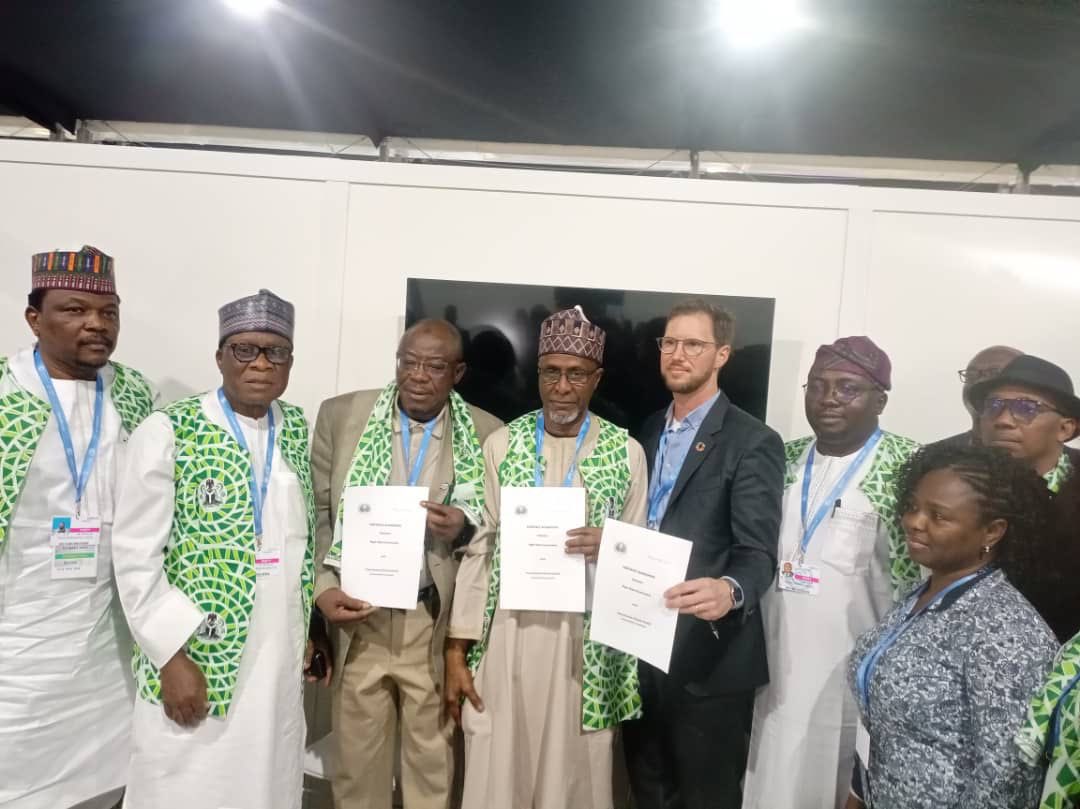By Adeyemi Adekunle
In advancement for environmental sustainability, the Nigeria Day at COP29 in Baku, Azerbaijan, culminated in a landmark bilateral agreement between the Niger State Government and FutureCamp, a renowned management consulting firm based in Germany.
This pivotal signing event, which took place on the sidelines of the international conference, was led by the Secretary to the State Government, Alhaji Usman Abubakar, and witnessed by key Nigerian officials, including the Honourable Ministers of Regional Development and Power, as well as the head of the Nigerian delegation at COP29, Minister of Environment, Alhaji Balarabe Abbas Lawal.
The signing is set to amplify Niger State’s commitment to transitioning toward a Green Economy, aligning with the global agenda on climate change. This move comes on the heels of Governor Mohammed Umaru Bago’s recent legislation establishing the Niger State Agency for Green Initiatives (NGSAGI), which aims to spearhead the implementation of the Niger State Blueprint for a sustainable future. The agency is envisioned as a dedicated body that will drive policies and initiatives surrounding environmental conservation and climate action.
“Today marks a transformative step in our journey towards a greener Niger State,” said Alhaji Usman Abubakar during the signing ceremony. “This partnership with FutureCamp represents not just a contract, but a commitment to nurturing our environment and exploring new avenues for sustainable development.”
In a world grappling with the effects of climate change, the agreement is particularly timely. The engagement with FutureCamp, a firm founded in 2001 that specializes in mandatory and voluntary carbon markets, offers Niger State access to invaluable resources and expertise. FutureCamp’s focus on carbon trading and climate policy aligns perfectly with the Nigerian government’s renewed efforts to harness carbon market potential.
Governor Bago, affectionately referred to as the “Farmer Governor,” had previously voiced his administration’s dedication to environmental stewardship during COP28 in Dubai. His promise to enhance the state’s capabilities in carbon markets has now taken a substantial step forward with this new partnership. The contract aims not only to activate the carbon market potential but also to facilitate the Niger State Government in attracting over N1 trillion in resources and investments that could significantly contribute to local and national economic development.
In his remarks at COP29, Minister of Environment Alhaji Balarabe Abbas Lawal urged other states in Nigeria to emulate Niger State’s proactive initiatives. He called for increased collaboration between sub-national governments, the Ministry of Environment, and the National Council on Climate Change (NCCC) to develop strategic frameworks and enhance technical capacity for engaging in carbon markets. “The time for action is now,” Lawal emphasized. “We must ensure that our environmental policies are not just ideals but practical steps toward achieving our obligations under the Paris Agreement and our Nationally Determined Contributions (NDCs).”
Under the new agreement with FutureCamp, Niger State aims to build a comprehensive carbon registry and establish robust institutional and regulatory frameworks that will allow for sustainable management of carbon credits. This is part of a broader strategy to position the state as a leader in climate action and environmental management in Nigeria.
Furthermore, FutureCamp is expected to support the development of technical capacity within the Niger State government. This entails equipping local stakeholders with the necessary skills and knowledge to navigate the complex landscape of carbon markets, allowing them to make informed decisions that align with global best practices.
As the effects of climate change become increasingly evident, the importance of carbon markets in facilitating a transition to low-carbon economies cannot be overstated. Countries and regions that capitalize on these markets not only contribute to global sustainability efforts but also position themselves to benefit economically from emerging green investments.
Niger State’s initiative resonates with the broader goals of COP29, where discussions revolve around innovating climate solutions and enhancing commitments to sustainable practices. This contract reveals Niger State’s proactive approach to environmental issues, showcasing its readiness to take on the responsibilities of climate change mitigation and adaptation.
As the transition to a Green Economy gathers momentum, the collaborative efforts between state and international partners like FutureCamp will be pivotal in defining Nigeria’s response to the global climate crisis. With its recent legislative strides and international partnerships, Niger State is poised to emerge as a beacon of sustainability within Nigeria, inspiring other states to follow suit in embracing environmental conservation as a cornerstone of development.
Looking ahead, the strategic partnership and the establishment of NGSAGI underscore a renewed commitment to sustainable governance, emphasizing that the ecological wellbeing of Niger State is paramount to its economic prospects. The collaborative efforts at COP29 bring hope that with concerted actions, the dreams of a greener future, backed by solid policy frameworks and international support, are well within reach for both Niger State and Nigeria as a whole.
This pivotal moment at COP29 may very well serve as a blueprint for other nations and sub-nationals worldwide seeking to harness the power of carbon markets in the fight against climate change. As Niger State invests in its green initiatives, it is not merely making a political statement; it is forging a sustainable future for generations to come.




